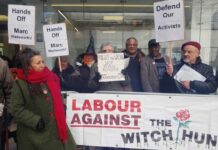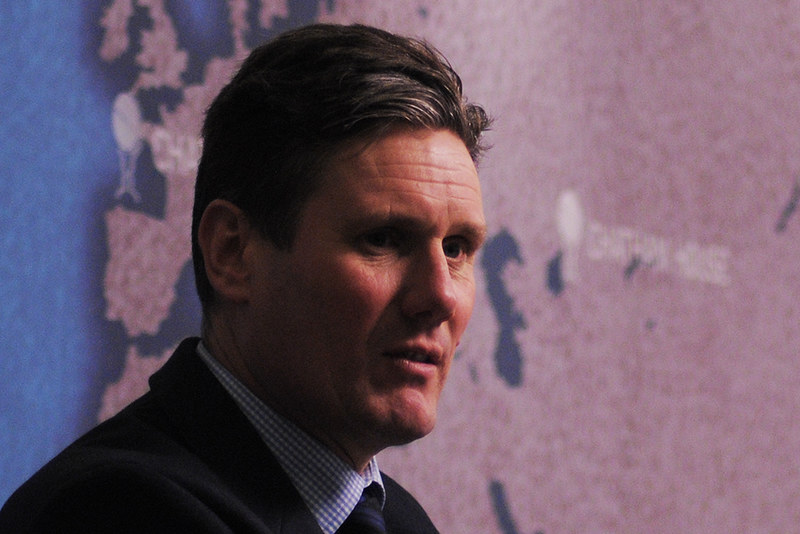19 March 2021 | ANALYSIS
Wolves of Westminster yesterday reported on a meeting of the so-called ‘Labour In Exile Network’ (LIEN), featuring several individuals who had been suspended by the Labour Party and were critical of the direction the party is heading in under Sir Keir Starmer. Some of these individuals described themselves as “Marxists”, with one going as far as to say “we consider ourselves revolutionary socialists” when calling for their agenda to involve a greater amount of change in the status quo.
In this article, we explore and evaluate some of the claims and arguments made by members of the group during this meeting.
- UK COVID-19 death rate
Graham Bash, understood to be the partner of former Momentum vice-chair Jackie Walker, was one of the first speakers of the meeting and he declared: “We are in opposition, have no doubt, in opposition firstly, of course, to this right-wing Government, which has put profit before the health of our people, achieved the highest rates of COVID deaths in the world.”
The Government has faced a lot of criticism for COVID-19 deaths, but British deaths were not at the time and are still not, the “highest in the world” by any measure. In terms of death per capita, at the time of writing, according to Statista, the UK is in fourth place, behind the Czech Republic, Belgium and Slovenia. In terms of individual deaths, the UK is slightly lower in the rankings in fifth behind the United States, Brazil, Mexico and India.
- Salaries
A motion discussed at the meeting was to call on all elected officials within the Labour Party, including MPs, to take only the salary of an average worker, with the balance being donated to a cause that supports the Labour cause. The argument was that such a move would cut down careerism and bureaucracy.
However, such a move may in fact amplify the financial pressures of even running for office. In the book Why We Got The Wrong Politicians by journalist Isabel Hardman, the author revealed the high cost of running for office. On average it costs £11,118 of the candidate’s own money, but for marginal seats, the costs are far higher. Labour candidates in these seats have to cough up on average £19,022.
The high costs for running for office are cited as a reason why it is harder for people from working-class backgrounds to break into politics and get elected. Those figures are already a high proportion of most people’s salaries, and this is just for the job interview alone. If the financial reward for winning and holding on to a seat are then given up, the candidates from less well-to-do backgrounds may well find it more difficult, both to run at first as well as then to campaign again for re-election if they do find a find a way to win.
- David Evans
Speaking in response to a proposal that called for the removal of the position of a Labour leader, other than for formal purposes, and the move towards collective leadership, Tony Greenstein, who was expelled from Labour for anti-Semitism, though he himself is Jewish, declared: “We obviously want to mobilise against David Evans, who is unelected and who has behaved like a complete autocrat and dictator.” He went on to add that there had been no significant debate on this topic within the party, so whilst the group could initiate a debate, he felt that such a move would threaten to marginalise LIEN.
David Evans is the current General Secretary of the party. His predecessor, Jennie Formby, resigned following Sir Keir Starmer’s election as Labour leader. Mr Evans was one of a number on the shortlist including former Jeremy Corbyn advisor Andrew Fisher and former MEP Neena Gill. Mr Evans was appointed after he won 20 votes from the 38-member National Executive Committee (NEC).
All 38 members of the NEC who voted to elect Mr Evans with a small majority are themselves elected, either by the party as a whole or by constituencies within the party. Membership currently consists of the party leader, deputy leader, treasurer, three frontbenchers, one member of Young Labour, 13 trade union representatives, one Socialist Society representative, one representative from BAME Labour, 9 representatives from the Constituency Labour Parties (CLPs), 2 Labour Councillors, 3 representatives from the Parliamentary Labour Party (PLP) and two members from Scottish Labour and Welsh Labour.
Labour’s Chief Whip and PLP Chair are also entitled to attend, but do not get a vote in meetings. The claims of Mr Evans being “unelected” or “autocratic” were echoed throughout the meeting.
- Hostile media
Leah Levane, a current Councillor on the Castle ward of Hastings Council, was one of the speakers at the meeting. She accused the “mainstream media” of not really covering certain issues, such as those in India, Myanmar, Palestine and Indonesia. However, a search of the LexisNexis database of news articles finds that, in the national newspapers since New Year’s Day, there have nearly 200,000 mentions of “India farmers”, over 400 mentions of “Myanmar coup”, around 250 mentions of “Palestine” and over 1,200 mentions of “Indonesia”.
The Councillor also claimed that the left faces a hostile media, “from The Sun to the BBC to The Guardian to Private Eye”, despite The Guardian endorsing Labour at each of the last two General Elections, although in 2017, they backed SNP candidates in Scotland able to defeat the Tory candidate. In 2019, Despite backing Labour, the newspaper added they were also “backing candidates who can defeat the Tories in constituencies where Labour is an also-ran – from the SNP, the Lib Dems, the Greens and Plaid Cymru to pro-European independents.”
- 2017 election performance
Speaking of the 2017 General Election, one of the next speakers was Roger Silverman, who has not yet been suspended but admitted to being surprised at that fact. Mr Silverman stood for election to the NEC and claimed to have had the backing of 65 CLPs. Pointing out that Labour had more votes in 2019 than in 2015, 2010 and 2005, he further claimed that the Labour Party performance at the 2017 election was better than the party managed in 1997, “if you exclude Scotland”.
The Labour Party does not stand candidates in Northern Ireland, so including just England and Wales, in 2017, the party got 107 fewer seats and just over 70,000 fewer votes than in 1997. They increased 1.6 percentage points in the share of the vote in England, but dropped 5.8 points in Wales.
Scotland, of course, has 59 Westminster constituencies and according to the most recent data from National Records Scotland, it has just over 4 million eligible voters. A common argument is that Labour would find it almost impossible to win an overall majority without Scottish support, so the notion of removing Scotland from the picture to make a point could be viewed as arbitrary and counter-productive.
- 2000 London mayoral election candidate selection
In 2000, Ken Livingstone famously stood as an independent candidate in the London mayoral election, after former Health Secretary Frank Dobson won the Labour nomination battle ahead of Mr Livingstone and Highgate MP Glenda Jackson.
Discussing the removal of Anna Rothery from the Liverpool Mayor shortlist – which he claimed was a result of her being “too left” – and whether or not LIEN should protest the events and back a potential Ms Rothery mayoral challenge, Mr Greenstein compared the two scenarios.
He declared: “Tony Blair contrived an electoral college in London which meant he got the most votes but still wasn’t selected as candidate, he stood independently and he won – he won twice – the Labour Party was forced to take him back.”
The 2000 selection race was not a straight one-person-one-vote race, instead having an equal one-third weighting given to elected Labour Party members, ordinary members and affiliated trade unions. Mr Livingstone in both rounds won a majority of individual members and trade unions, with large majorities in the trade unions. Mr Dobson won a slender majority in the electoral college after securing more than 85% of the votes of elected members in both rounds.
In the actual mayoral election, Mr Livingstone secured three times the vote of Mr Dobson in the first round, moving to the second round of voting with Tory candidate Steven Norris, a former MP.
Whilst the argument that Mr Livingstone lost out due to the electoral college procedure is true, the idea that it was entirely due to Mr Blair “contriving an electoral college” is not valid. Labour internal elections have a slightly longer history of this forming of electoral colleges.
When Mr Blair himself faced John Prescott and Margaret Beckett in the 1994 leadership election, the three constituencies were the affiliated unions, the PLP and the CLPs, with Mr Blair winning a majority in all three. The first time a weighted electoral college was introduced into leadership elections was in 1980, when Neil Kinnock defeated Roy Hattersley, Eric Heffer and Peter Shore.
- Conclusion
At no point in the meeting were any of the six ideas and claims above challenged by other attendees. Sir Keir said in the leadership race: “My message to our members is essentially that they’ve got a choice – we as a party can mope around, head in hands, arguing with each other, pointing fingers about who’s to blame for this, that and the other. Or we could decide the next four years of our history is for us – we can pull together and shape what happens next.”
In his victory speech, he declared: “Under my leadership, we will engage constructively with the Government. Not opposition for opposition’s sake. Not scoring party political points or making impossible demands.”
Of course, in a democratic political environment, the difference in views within a party is to be expected. One attendee at this meeting, Rebecca Massey, who was expelled from the party for, as she claims, backing Chris Williamson’s failed re-election bid, said over 500 people were either on the Zoom call itself or viewed it via Facebook.
Cllr Levane is a Labour elected official, while Mr Silverman made it to round 30 of his NEC election race.
This group’s level of opposition and the validity of some of the claims has the potential to cause headaches for Sir Keir, Mr Evans and the party’s electoral chances going forward. The fact that members have been competitive in internal elections, hints at the possibility of being able to form a coalition that could influence candidate selection.
If candidates backed by this group and their activists continue to make invalid claims that can easily be fact-checked, this could be a real threat to putting the brakes on the Labour machine. Tory-backing newspapers will be sure to use these to undermine any Labour campaign, in the same way that one might expect from The Guardian or The Mirror if right-wing activists were making inaccurate claims.

























